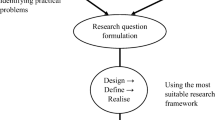Abstract
Recognizing the immense purchasing power of children, marketing researchers often gather information from them. Given the vulnerability of these children as research subjects, this paper explores the different ethical standards that marketing researchers could adopt in their research efforts. The Paternalistic Ethical Standard and the Limited Paternalistic Ethical Standard are discussed and the ethical quandary known as the Pontius Pilate Plight is identified in the context of the latter standard. An enhanced version of the Limited Paternalistic Standard is suggested as an ethical guide for marketing researchers. Based on interviews with professional marketing researchers to gauge the applicability of the proposed standard, managerial implications are identified.
Similar content being viewed by others
References
Ahuja, Roshan D., Louis M. Capella andRon D. Taylor: 1998, ‘Child Influences, Attitudinal and Behavioral Comparisons Between Single Parent and Dual Parent Households in Grocery Shopping Decisions’, Journal of Marketing Theory and Practice 6 (Winter), 1, 48–61.
Ahuja, Roshan D. and Mary Walker: 1999, ‘The Increased Purchasing Power of Children and the Ethical Dilemma It Poses To Marketing Researchers’, Advances in Marketing: Theory, Practice, and Education (October), Joyce A. Young,Robert D. Green andFaye W. Gilbert (eds.), Society for Marketing Advances, Atlanta, GA, pp. 128–130.
Aiken, William andHugh LaFollette (eds.): 1980, Whose Child? Children's Rights, Parent Authority and State Power (Rowan and Littlefield, NJ).
Acuff, Dan S. and Robert H. Reiher: 1997, What Kids Buy and Why (The Free Press, New York, NY).
Alwitt, Linda F. and Thomas D. Donley: 1996, The Low-Income Consumer (Sage, California).
Brenkert, George C.: 1997, ‘Marketing to Inner-City Blacks: PowerMaster and Moral Responsibility’, case appearing in Ethical Theory and Business, by Tom L. Beauchamp and Norman E. Bowie (Prentice-Hall, Inc., Englewood Cliffs, NJ), p. 485.
Collini, Stephan (ed.): 1997, On Liberty, by John Stuart Mill (Cambridge University Press, Cambridge, Great Britain).
Churchill, Gilbert A.: 1996, Marketing Research, 3rd edition (Dryden Press, Orlando, FL), pp. 9, 70.
Day, Robert: 1975, ‘Comment on Ethics in Marketing Research’, Journal of Marketing Research (May), 232–233.
Dworkin, Gerald: 1983, ‘Paternalism’, in Rolf Sartorius (ed.), Paternalism (University of Minnesota Press, Minneapolis, MN), pp. 19–34.
Ebejer, James M. andMichael J. Morden: 1988, ‘Paternalism in the Marketplace: Should a Salesman Be His Buyer's Keeper’, Journal of Business Ethics 7, 337–339.
French, Warren and Elner Myra: 1986, ‘A Practical Look at Research Ethics’, Journal of Data Collection, 49–53.
Gutman, Amy: 1980, ‘Children, Paternalism, and Education: A Liberal Argument’, Philosophy and Public Affairs 9(4), 339–358.
Hunt, Shelby, D., Lawrence B. Chonko andJames B. Wilcox: 1984, ‘Ethical Problems of Marketing Researchers’, Journal of Marketing Research 21 (August), 309–324.
Karpatkin, Rhoda H.: 1999, ‘Toward a Fair and Just Marketplace for All Consumers: The Responsibilities of Marketing Professionals’, Journal of Public Policy and Marketing 18 (Spring), 120.
Laczniak, Gene R.: 1999, ‘Distributive Justice, Catholic Social Teaching, and the Moral Responsibility of Marketers’, Journal of Public Policy and Marketing 18 (Spring), 126.
Leonhardt, David and Kathleen Kerwin: 1997, ‘Hey Kid, Buy This’, Business Week, June 30, 62–68.
Malhotra, Naresh K. and Gina L. Miller: 1998, ‘An Integrated Model for Ethical Decisions in Marketing Research’, Journal of Business Ethics 17, 263–280.
Mazis, Michael B., Debra J. Ringold,Elgin S. Perry andDaniel W. Denman: 1992, ‘Perceived Age and Attractiveness of Models in Cigarette Advertisements’, Journal of Marketing 56 (January), 22–37.
McNeal, James U.: 1992, Kids As Customers: A Handbook of Marketing to Children (Lexington Books, New York, NY).
Petty, Ross D.: 1993, ‘Joe Camel and the Commission: The Real Legal Issues’, Journal of Public Policy and Marketing 12(2) (Fall), 276–281.
Rittenburg, Terri L. and Madhavan Parthasarathy: 1997, ‘Ethical Implications of Target Market Selection’, Journal of Macromarketing 17(2), 49–64.
Skinner, Steven, J., O. C. Ferrell andAlan J. Dubinsky: 1988, ‘Organizational Dimensions of Marketing Research Ethics, Journal of Business Research 16, 209–223.
Smith, Craig N. and Elizabeth Cooper-Martin: 1997, ‘Ethics and Target Marketing: The Role of Product Harm and Consumer Vulnerability’, Journal of Marketing 61 (July).
Tybout, Alice and Gerald Zaltman: 1974, ‘Ethics in Marketing Research: Their Practical Relevance’, Journal of Marketing Research (May), 234–237.
VanDeVeer, Donald: 1982, ‘Paternalism and Restrictions on Liberty’, in Tom Regan andDonald VanDeVeer (eds.), And Justice for All (Rowan and Allanheld, NJ).
Walters, Kerry S.: 1989, ‘Limited Paternalism and the Pontius Pilate Plight’, Journal of Business Ethics 8, 955–962.
Whalen, Bernie: 1984, ‘Research Rise in Use of “JR” Research Tactics’, Marketing News 18, May, 1.
Author information
Authors and Affiliations
Rights and permissions
About this article
Cite this article
Ahuja, R.D., Walker, M. & Tadepalli, R. Paternalism, Limited Paternalism and the Pontius Pilate Plight When Researching Children. Journal of Business Ethics 32, 81–92 (2001). https://doi.org/10.1023/A:1010651013401
Issue Date:
DOI: https://doi.org/10.1023/A:1010651013401




